88% of consumers call or visit a local business within 24 hours of finding it online.
When a prospect in your area looks up “landscaper near me”, chances are, they could be your next client.
The question is: Will they find your business?
In 2026, SEO for landscaping companies is the best way to dominate Google and even AI tools like ChatGPT. It’s how you stay visible. And stay booked.
Look, the competition is only heating up. Today, we’re giving you 12 proven SEO strategies behind returns as high as 800%. Keep scrolling!
Key Takeaways
- Optimize your Google Business Profile — it’s the first place locals look.
- Write content that answers real homeowner questions, not just keyword lists.
- Make your website fast, mobile-friendly, and easy to navigate.
- Regularly collect and respond to customer reviews.
- Track what’s working in Google Analytics and adjust monthly.
What Is SEO for Landscapers
SEO (search engine optimization) boosts your landscaping website and online presence to appear on Google, Maps, local directories, and even ChatGPT.
In 2026, landscaping SEO is your bread and butter! Nearly 90% of people who search for a local service online contact a business within 24 hours.
SEO includes (but isn’t limited to):
- Optimizing your website for local keywords homeowners use, like “landscaper near me” or “yard cleanup in [your city].”
- Claiming and updating your Google Business Profile so you show up on Maps.
- Creating service pages for each city or area you serve.
- Writing helpful blog content that answers common landscaping questions.
- Collecting and responding to customer reviews to be trusted more and gain online visibility.
With the right SEO setup and the help of a landscaping marketing agency, your company could rank higher and, by default, pull in a flood of new leads in your service area.
Why You Need Landscaping SEO
Invisible on Google? Then you’re invisible in your market.
68% of all online experiences start on a search engine like Google. If you want your landscaping business to stay fully booked, SEO for landscaping companies is vital.
Here’s what strong landscaping SEO does for you:
- Increases Visibility: Gets your business to show up when people search for terms like “landscaping company near me.”
- Attracts Qualified Leads: Targets real homeowners ready to book services like lawn care, tree trimming, or garden design.
- Drives Local Traffic: Helps nearby clients find you through Google Maps, local directories, and AI search tools.
- Builds Credibility: A professional, optimized site and consistent reviews make your company look trustworthy before you even talk to them.
- Delivers Steady Growth: SEO keeps your pipeline full month after month, without paying for every click.
Case in point: After we used SEO and redesigned the site for Absolute Home Services, they ranked #1 for “painting services,” achieved a 922% increase in qualified leads, and reached a 4,363% ROI — all from smarter search visibility!
Top 12 Landscaping SEO Strategies
Okay, time for action!
These are your money moves — 12 step-by-step landscaping SEO strategies to keep your schedule packed all year long.
1. Optimize Your Google Business Profile
First up, your Google Business Profile (formerly Google My Business).
Nearly 46% of all searches on Google have local intent — meaning customers are looking for a business near them. That’s why local SEO for landscapers starts with your GBP:
- Claim and verify your Google Business Profile.
- Add accurate business info — name, address, phone, and website.
- Choose “Landscaping Service” as your main category.
- Upload high-quality project photos (before-and-afters work great).
- Write a keyword-rich business description that highlights your specialties.
- Post weekly updates — promos, seasonal offers, and tips.
- Encourage clients to leave reviews and respond to every single one.
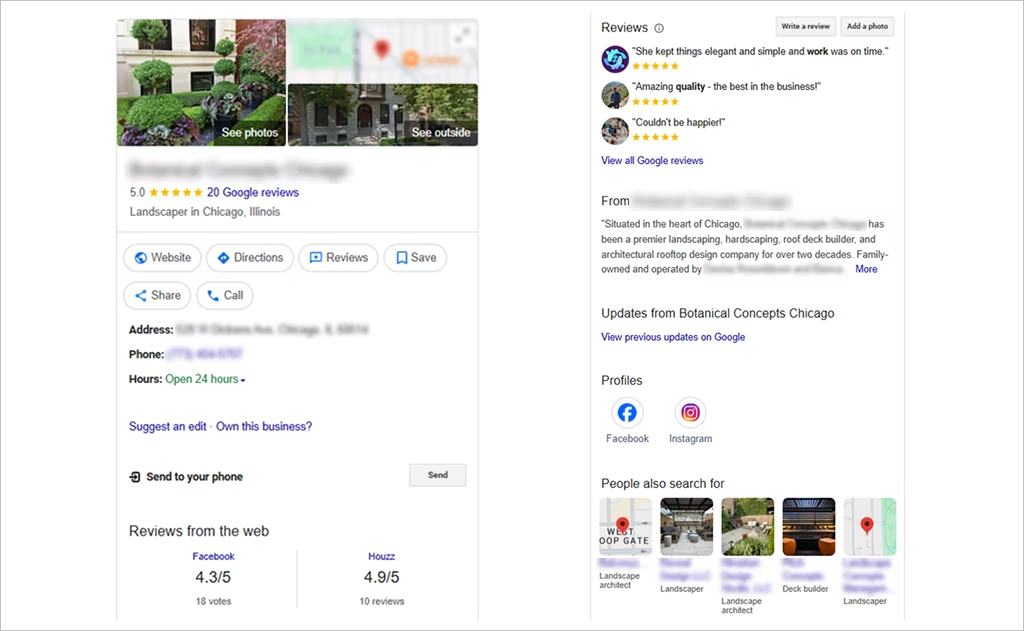
Your GBP is a vital cog in boosting your visibility in search engine results. Ignore it and it will be a costly mistake!
2. Master Local SEO for Landscapers with Strategic Keywords
Your target audience rarely searches, “professional landscaper in Denver.”
More often, it’s something like “yard cleanup after winter.”
See the difference? Good local SEO for landscaping companies will reveal what people actually search. Here’s how to build a relevant keyword strategy:
- Use specific keywords that mirror local intent (“backyard landscaping ideas for small homes”).
- Sprinkle your main keyword naturally into titles, headers, and body text — 75% of top-ranking pages include their target keyword in both the title and body content.
- Optimize for voice search with question-based phrases like “When should I fertilize my lawn?”
- Do keyword research with tools like SEMrush or Google Keyword Planner to find phrases homeowners use to find local services.
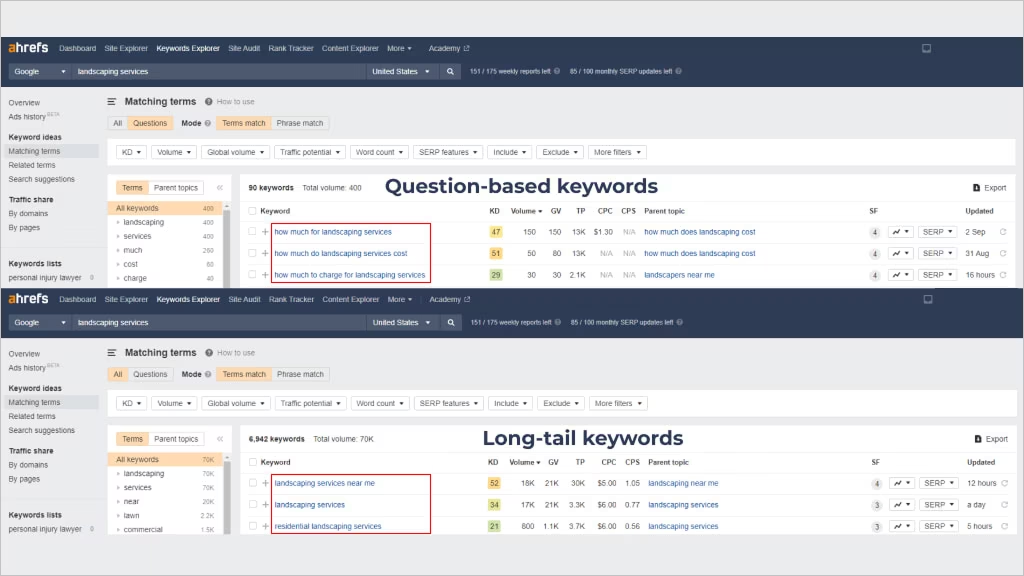
Unsure where to begin? Here are some of the best SEO keywords for landscapers right now:
| Best SEO Keywords for Landscapers | ||
|---|---|---|
| # | Keyword | Monthly Volume (US) |
| 1 | landscapers near me | 56,000 |
| 2 | lawn care | 42,000 |
| 3 | landscape design | 39,000 |
| 4 | lawn aeration | 14,000 |
| 5 | landscaping services near me | 9,100 |
| 6 | lawn mowing | 9,600 |
| 7 | retaining walls | 7,800 |
| 8 | garden design | 6,100 |
| 9 | landscaping company | 6,400 |
| 10 | landscaping rock | 3,900 |
| 11 | landscape designers near me | 3,500 |
| 12 | landscape contractor | 3,200 |
| 13 | sprinkler system installation near me | 2,400 |
| 14 | residential landscaping | 2,200 |
| 15 | best landscapers near me | 2,100 |
| 16 | garden landscaping | 2,000 |
| 17 | lawn care companies | 1,900 |
| 18 | local landscapers | 1,600 |
| 19 | landscape contractors near me | 1,600 |
| 20 | landscaping contractors | 1,600 |
| 21 | hardscape contractors near me | 1,600 |
| 22 | organic lawn care near me | 1,600 |
| 23 | garden plans | 1,300 |
| 24 | landscaping business near me | 600 |
| 25 | mulching services | 600 |
3. Create High-Quality, Relevant Content for Landscaping Services
What you’re reading right now is content — and hey, it’s holding your attention for a reason!
That’s exactly what great content should do for your landscaping business: grab attention and inspire action.
In fact, 61% of consumers say they’ve made a purchase after reading a blog. To cash in, add this to your SEO for landscapers strategy:
- Stick to one topic per page. If it’s about lawn care, don’t mix in snow removal — focus helps Google understand your expertise.
- Write for humans. Picture the homeowner staring at their patchy yard, not a search bot scanning your site.
- Use clear, local language. Talk like someone from your area… human and empathetic.
- Add helpful, visual content. Before-and-after photos, short videos, or quick project tips.
- Show your experience. Google’s E-E-A-T (Experience, Expertise, Authoritativeness, and Trustworthiness) rewards credibility and authenticity.
Pro Tip: Use tools like ChatGPT, Jasper, or SurferSEO to outline ideas and create insightful, attention-grabbing copy.
Ready to increase client engagement? Learn how landscaping email marketing can boost your business in no time!
Get Leads with Great Content
Your content rules over your SEO and your pipeline! Get solid content now.
4. Build Local Service Pages for Each Area You Serve
Do you serve multiple towns or neighborhoods?
Do not cram them all onto one “service area” page. Google hates that, and so do your prospects (i.e., potential clients).
Rather, create a dedicated page for each location you serve. Each one should include:
- A short intro mentioning the city or suburb by name.
- Details about your landscaping services in that area.
- Local landmarks or neighborhoods you’ve worked in.
- A few customer reviews specific to that location.
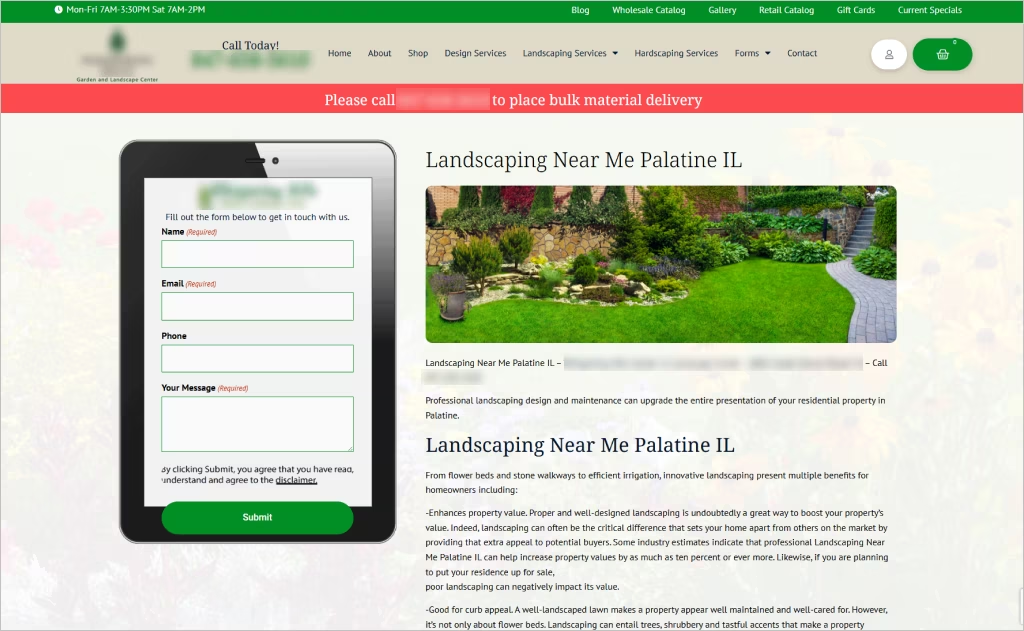
Everyone loves a personal touch… and that includes seeing their own community mentioned by name.
It makes your business feel local! A smart addition to your digital marketing.
Want to generate more sales? Explore how landscaping PPC can help you reach more potential clients quickly!
5. Optimize Meta Titles and Descriptions for Local Keywords
Your meta title is the blue headline people see on Google.
Your meta description is the short summary right underneath it.
Together, they’re your first impression. Pages with optimized meta titles see an 8.9% better click-through rate. Here are our top tips:
- Keep it short and clear. Around 60 characters for titles and 155 for descriptions.
- Add local intent. Include your city or area — “landscaping company in [city]” — to show up for local customers.
- Match the content. No clickbait. Misleading titles hurt trust and search engine rankings.
- Add a CTA. Use action phrases like “Get a free quote” or “View our projects.”
- Use this format:
Primary Keyword | Service | Brand Name
Example: Landscaping Services in Austin | Lawn Care Experts | GreenScape Co.
Use tools like ChatGPT or SurferSEO to craft short, keyword-rich titles and descriptions that grab clicks and stay within limits. This is SEO for landscapers smartly played!
6. Ensure Website Mobile Optimization
60% — that’s how many Google searches now happen on mobile devices!
Is your landscaping website mobile-friendly? Check ASAP. Most landscaping company websites aren’t, and they miss out on vital traffic.
Your site should load fast, look great, and be easy to navigate on any screen. That means:
- A responsive layout that automatically adjusts to phones and tablets.
- Simple navigation — visitors should find what they need in three clicks or less.
- Fast load times — every extra second can drop conversions by up to 20%.
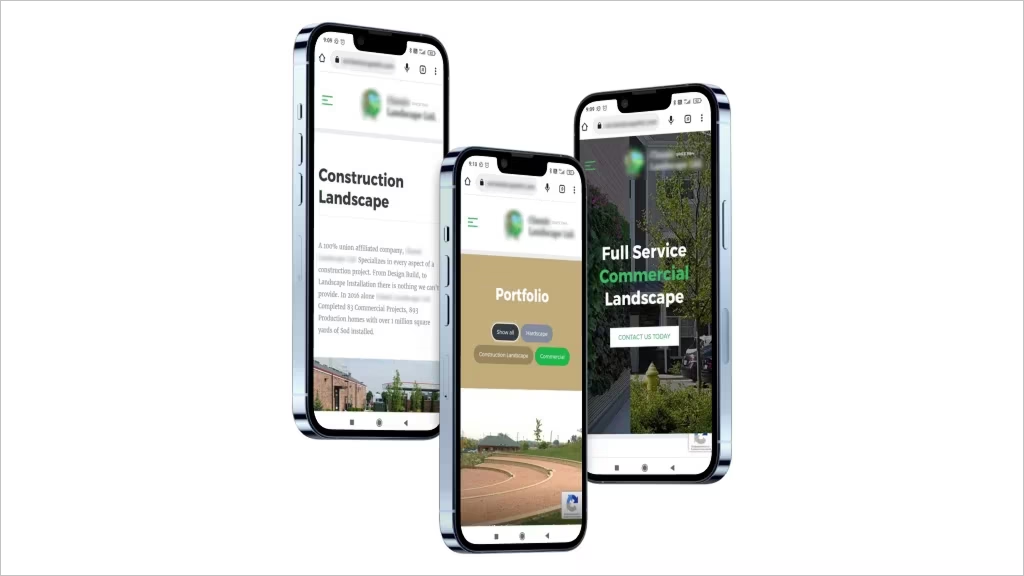
Use tools like Google Lighthouse, PageSpeed Insights, or BrowserStack to test your mobile performance and fix issues before clients click away.
Your competitors are ranking — why aren’t you? A landscaping SEO company can fix that!
Next Step: Get a Mobile-Friendly Site
Comrade builds beautiful, sleek sites that attract qualified leads in your area!
7. Keep Your NAP Consistent Across All Platforms
This might seem like a small thing, but it’s one of the biggest trust signals Google looks for.
Your NAP — name, address, and phone number should be identical everywhere you appear online.
“GreenScape Landscaping LLC” on Google, but “GreenScape Lawn Care” on Yelp is confusing.
Even tiny changes like “123 Maple Avenue” vs “123 Maple Ave” can hurt your search rankings and cost you local leads.
So, we’ll say it again: Make sure your NAP is identical everywhere it appears — on your Google Business Profile, Yelp, Facebook, Angie’s List, your website footer — everywhere. This is vital for your local search results rankings.
8. Get Listed in Reputable Directories and Citations
Next up, get listed on local directories.
This is a power move for SEO marketing for landscapers!
These listings help Google verify your business information and improve local rankings. The more consistent your citations, the better! Start with these must-do platforms:
- Yelp — Great for reviews and local discovery.
- Facebook — Adds social proof and engagement.
- Angi (Angie’s List) — Popular for home improvement and service pros.
- MapQuest — Improves visibility in map-based searches.
- Better Business Bureau (BBB) — Boosts trust and legitimacy.
- Thumbtack — Connects you with homeowners ready to hire.
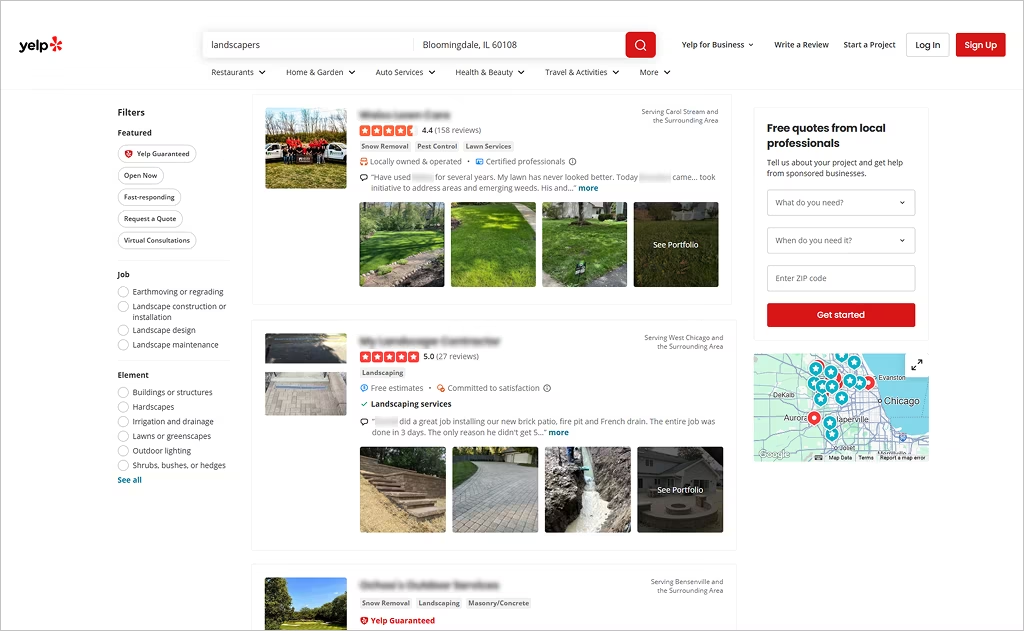
Again, keep your name, address, and phone number (NAP) identical across all listings, include your website link, and upload high-quality photos of your work.
9. Collect and Leverage Customer Reviews
Your landscaping clients are your best brand ambassadors.
98% of consumers read online reviews for local businesses, and most won’t call unless they see solid feedback.
Reviews don’t just inspire trust. They also boost your local search rankings, seeing as Google favors companies with consistent, authentic testimonials.
Here’s how to use reviews to fuel your lawn care services:
- Ask right after a project — when the lawn still looks fresh and clients are thrilled.
- Share a direct link to your Google Business Profile or Facebook page.
- Respond to every review — even the critical ones.
Each review strengthens your credibility, so start racking them up, and you’ll notice your client inquiries go up!
See 400%+ Returns!
Find out how hundreds of local businesses see a 400% to 800% ROI at Comrade.
10. Engage with Your Audience on Social Media
Social media is a goldmine for leads.
And while it’s not a direct ranking factor, it’s a huge indicator of trust, visibility, and engagement — all of which support your local search engine optimization.
When people share your posts, tag your business, or click your website link, it signals to Google to boost your overall online presence.
Use this to hook potential customers:
- Post before-and-after photos that showcase your best projects.
- Share seasonal landscaping tips that drive engagement.
- Respond to every comment — active pages build credibility.
- Use local hashtags and tag your service areas to reach nearby clients.
Remember, 71% of consumers are more likely to buy after a positive social media interaction. Every like, comment, and share is potential revenue.
11. Strengthen Landscaping Website Optimization for AI Search
Google is still big — but people also find businesses on ChatGPT, Google’s AI Overviews, and Bing Copilot.
Tons of users now ask ChatGPT, “Who’s the best landscaper near me?” and get an instant answer.
That’s why Generative Engine Optimization (GEO) is the next frontier. It’s how you get your landscaping company featured inside those AI-generated responses.
What to incorporate in your local SEO strategies:
- Write content in Q&A format that answers homeowner questions.
- Add schema markup so AI tools understand your services.
- Keep pages authoritative, local, and well-structured.
Add this to your custom SEO strategy now, because by 2026, AI tools will capture 25% of all search traffic.
12. Measure, Track, and Improve Your SEO Performance
Finally, after all that groundwork, it’s time to see where you’re at.
Think of this as your landscaping SEO “temperature check”.
The best SEO services for landscapers don’t stop at setup — they measure, tweak, and improve over time! Here’s what to watch:
- Keyword rankings: Are you climbing for local searches like “landscaper near me”?
- Organic traffic: Is your site pulling in more visitors each month?
- Leads and conversions: Are those clicks turning into booked projects?
- Backlinks and reviews: Is your credibility growing online?
Use Google Analytics or Search Console to track your progress, then adjust and grow. Smart SEO brings you steady, compounding progress.
Ready to 2.5x Your Lead Generation?
Join 330+ contractors who've transformed their business with our proven marketing strategies
Ready to Grow? Book Your Free Landscaping SEO Strategy Session
SEO for landscapers takes a LOT of time… especially if you want real rankings and leads.
For over 18+ years, Comrade has helped hundreds of local businesses thrive in competitive markets with a team of highly trained specialists.
Our landscaping SEO services, PPC, and high-converting web design services are all focused on one goal: filling your pipeline!
In fact, our clients consistently see:
- 400%+ ROI on their marketing
- Hundreds of highly qualified local leads
- Top Google rankings in their service areas
Your crew handles the lawns. We’ll bring you more leads!
